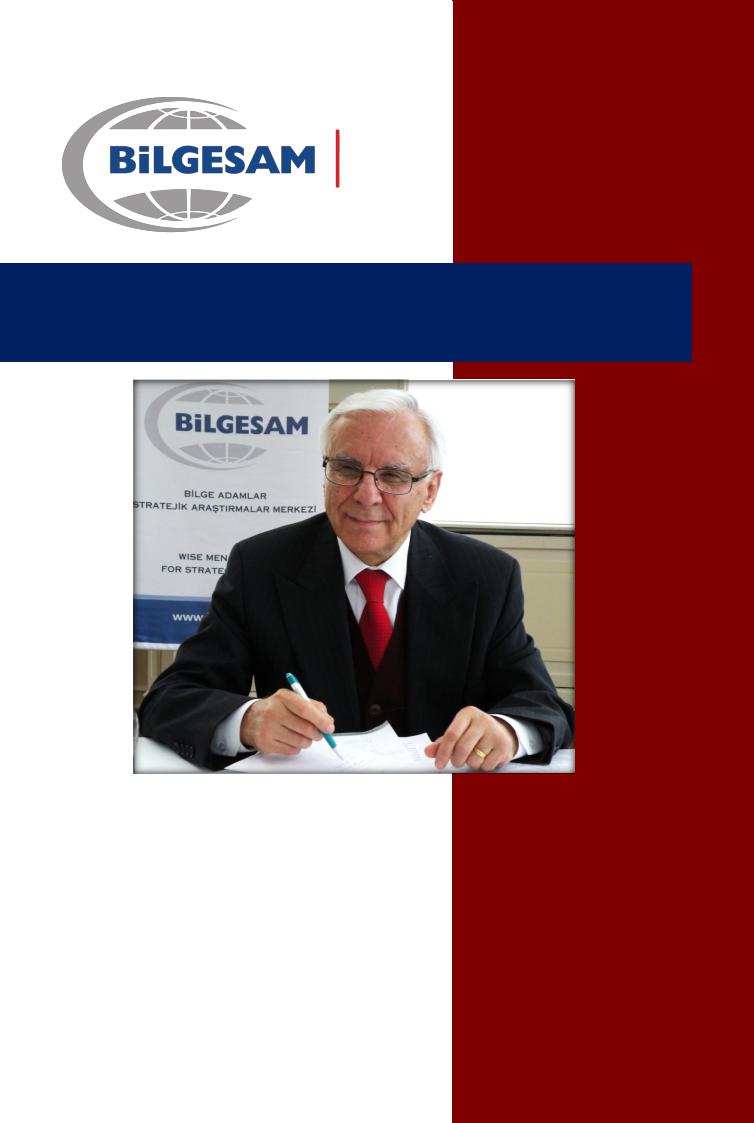
selcuk_sami_republic_modern_democracy_and_turkey_s_transform
.pdf
WISE MEN BOARD
REPORT
REPUBLIC, MODERN DEMOCRACY
AND TURKEY’S TRANSFORMATION
WISE MEN CENTER
FOR STRATEGIC STUDIES
Prepared By:
Prof. Dr. Sami SELÇUK
Translated By:
Hacer ŞARTEPE
REPORT NO: 23
İSTANBUL
2010

REPUBLIC, MODERN DEMOCRACY AND
TURKEY’S TRANSFORMATION
Prepared By:
Prof. Dr. Sami SELÇUK
Translated from Turkish to English by:
Hacer ŞARTEPE
REPORT NO: 23

REPUBLIC, MODERN DEMOCRACY AND
TURKEY’S TRANSFORMATION
WISE MEN BOARD REPORT
Prepared By:
Prof. Dr. Sami SELÇUK
Translated from Turkish to English by:
Hacer ŞARTEPE
BILGESAM PUBLICATIONS
Wise Men Center For Strategic Studies
Mecidiyeköy Yolu Caddesi No:10
Celil Ağa İş Merkezi Kat:9 Daire:36-38
Mecidiyeköy / İstanbul / Türkiye
Tel: +90 212 217 65 91 Faks: +90 212 217 65 93
Atatürk Bulvarı Havuzlu Sok. No:4/6
A.Ayrancı / Çankaya / Ankara / Türkiye
Tel : +90 312 425 32 90 Faks: +90 312 425 32 90
www.bilgesam.org bilgesam@bilgesam.org
Copyright © 2010
All rigths reserved.
This shall not be copied without the permission of
Wise Men Center for Strategic Studies (BILGESAM).
WISE MEN BOARD
President
Salim Dervişoğlu (R. Admiral)
Vice Presidents
İlter Türkmen (Former Minister/Ambassador)
Sami Selçuk (Prof. Dr./Honorary President of the Court of Cassation)
Board Members
Kutlu AKTAŞ (Former Minister/Governor)
Özdem SANBERK (R. Ambassador)
Oktar ATAMAN (R. General)
Necdet Yılmaz TİMUR (R. General)
Sabahattin ERGİN (R. Vice Admiral)
Nur VERGİN (Prof. Dr.)
Orhan GÜVENEN (Prof. Dr.)
Ali KARAOSMANOĞLU (Prof. Dr.)
Sönmez KÖKSAL (R. Ambassador)
Güner ÖZTEK (R. Ambassador)
İlter TURAN (Prof. Dr.)
Çelik KURTOĞLU (Prof. Dr.)
Ersin ONULDURAN (Prof. Dr.)
FOREWORD
When Turkish history is analyzed, it is seen that there are well educated wise men that stand behind the achievements. Though, the multi-dimensional development of the events and the complexity of the issues lead some wise people or intellectuals to have some difficulties in correctly perceiving the events on time and produce alternative policies. Following the improvements closely, making realistic previsions about the future and producing the right policies necessitate the gathering of wise people from various fields and who have different views, with young dynamic researchers in order to provide a synergy between them in flexible organizations.
The Wise Men Center for Strategic Studies (BILGESAM) has been founded for several reasons: To follow national and international developments and make realistic predictions, to perform researches on Turkey’s bilateral and multilateral relations, as well as on security strategies, to provide decision-makers with realistic and dynamic solution proposals and policy options, which are in line with Turkey’s national interests. BILGESAM’s vision, objectives, working style, basic characteristics, its organization and publications can be viewed at http://www.bilgesam.org/tr
This report with the name of Republic, Modern Democracy and Turkey’s Transformation was prepared by Prof. Dr. Sami Selçuk, the Former President of the Court of Cassation in compliance with the decisions taken in the Sixth Wise Men Board Meeting. The report was improved in line with the suggestion of the Seventh Wise Men Board Meeting and it was decided to be published among the publications of BILGESAM.
Hopefully, the report will pave the way for Turkey in many regards and contribute to the development process of Turkey. I also would like to extend my heartfelt thanks to Prof. Dr.
Sami Selçuk, the Former Presaident of the Supreme Court of Appeals, who prepared the report and other members of the Wise Men Board, and lastly Hacer Şartepe who translated it from Turkish to English.
Assoc. Prof. Atilla Sandıklı
President of BILGESAM
FIRST SECTION

Republic, Modern Democracy and
Turkey’s Transformation
PRELIMINARY REMARKS
Nowadays, some debates exists over the distinction between republic, democracy and even the second democracy. At the heart of these debates lies the uncertainty deriving from the contradiction of these concepts. This contradiction of concepts arises from the conflict between the understanding of a republic, which is the product of the French Revolution or which somehow has come to the forefront with this revolution, and the understanding of democracy, which is the product of the evolution of the Anglo-Saxon system. This uncertainty arising from the dilemma of these concepts dominates the atmosphere.
These two concepts can sometimes be used as the equivalent of each other or interchangeably. However, sometimes their scope can be perceived differently.
This is not peculiar to Turkey. But instead, France also experienced such a perception for a long time and even in today’s France, such perception differences can be seen from time to time. For instance, Didier Maus, a lawyer on constitutional law, bases the republic on some principles as general will, representation, and the seperation of powers. Maurice Hauriou, who lived in the early 20th century and who is rightfully among the biggest lawyers, maintains that a republic is a form of government based on election. Furthermore, Maurice
Duverger, one of today’s the most eminent lawyers on constitutional law, integrates the concept of “republic” with all forms of government and even regimes which are based on election and popular sovereignty. He further calls the systems in Great Britain and the other similar systems “republican monarchy” (monarchies républicaines).
This view regards the concepts of “democratic regime” and “republic” as identical.
It is impossible to agree with this view.
Thus, it would be of great benefit to first touch upon the concepts of republic, monarchy and democracy.
Naturally, both republics and monarchies are forms of government.
The most striking difference between the two is the way of electing the leader of the state. Within the scope of monarchy, a family or a dynasty is entitled to presidency and it is something hereditary. On the contrary, in a republic, this authority belongs to the people themselves. It is the people themselves who, by election, either directly or through representatives choose the head of the state.
The concept of “republic” is, in essence, a compound word consisting of two words: “the thing/object that belongs to public/people” (res publica). Hence, when any political, public
1
